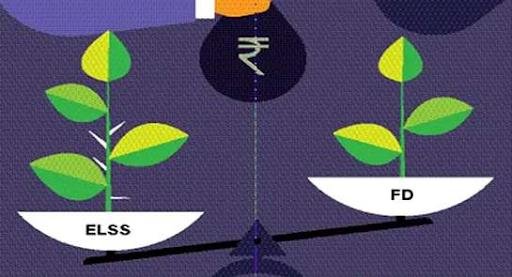Understanding ELSS and FD

ELSS and FD, Paying taxes is important, but you don’t have to pay more than you need to. Tax saving means finding legal ways to lower the amount of income tax you have to pay. This gives you extra money to do other things with, like investing, paying off debt, or saving more.
Read more: What are The Features of Fire Insurance in India?
Understanding ELSS and FD
In India, there’s a special rule called Section 80C of the Income Tax Act that helps with tax saving. It lets you subtract certain investments and expenses from your taxable income, which means you end up owing less tax.
ELSS (Equity Linked Saving Scheme): When you invest in ELSS, you’re essentially putting your money into a type of mutual fund. These funds pool money from many investors and then use it to buy stocks in various companies. This diversification helps spread out your risk, meaning a bad performance by one company won’t necessarily impact your entire investment. ELSS funds aim for long-term growth through capital appreciation, which means the value of your investment grows over time.
Diversification: Imagine putting all your eggs in one basket. If you drop the basket, all the eggs will break! Diversification is like using multiple baskets for your eggs. Even if you drop one, you still have eggs left in the others. Similarly, by investing in a variety of stocks through ELSS, you spread out your risk. If one company performs poorly, the good performance of others can help balance it out.
Fixed Deposit (FD): A fixed deposit (FD) is a more traditional investment option offered by banks. When you invest in an FD, you deposit a specific amount of money for a fixed period. However, FD interest rates are generally lower than the potential returns offered by ELSS.
Key Factors to Consider
ELSS invests in stocks, so its value can fluctuate with the market, meaning there’s a chance your investment could be worth less than what you put in. However, historically, ELSS has offered the potential for higher returns compared to fixed deposits. FDs, on the other hand, come with guaranteed returns and minimal risk. The bank promises a fixed interest rate for your deposit tenure, which can be anywhere from a few months to several years. This predictability makes FDs suitable for those seeking stability and income. Another key factor is the investment horizon. ELSS comes with a 3-year lock-in period, meaning your money is invested for at least 3 years. This long-term perspective is crucial to ride out market ups and downs and potentially benefit from ELSS’s growth potential. FDs offer more flexibility, with tenure options ranging from short-term to long-term. Finally, ELSS offers attractive tax benefits.
Who Should Choose ELSS?
ELSS is like a rollercoaster ride in the stock market, but it’s better suited for people who are in it for the long haul and don’t mind taking some risks. If you’re willing to stick with it for 5 years or more, you can handle the market going up and down and maybe even see big growth in your investment. Plus, you have to keep your money locked in for 3 years, which helps encourage a long-term mindset. It’s especially good for young folks who have time on their side and for those who want to see their money grow fast. And the cherry on top is the tax benefits: you can make gains up to Rs 1 lakh without paying taxes, and the taxes on long-term gains are lower. So, if you’re okay with a bit of risk and are thinking long-term, ELSS could be a smart way to save on taxes while building wealth.
Who Should Choose FD?
For those who prioritize safety and predictable returns over maximizing growth, fixed deposits (FDs) might be the perfect investment choice. Risk-averse investors seeking guaranteed returns and capital protection find comfort in FDs. The bank’s guarantee of a fixed interest rate on your deposit ensures you get your initial investment back in full at maturity. This stability makes FDs ideal for short-term goals within the next 3 years, as the money remains readily available. Similarly, those nearing retirement can leverage FDs as a safe haven for their savings. The steady stream of interest payments from FDs provides reliable income without the worry of market fluctuations, making them a secure option for your golden years.